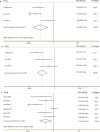FCGR2A, FCGR3A polymorphisms and therapeutic efficacy of anti-EGFR monoclonal antibody in metastatic colorectal cancer
- PMID: 26363448
- PMCID: PMC4695045
- DOI: 10.18632/oncotarget.4872
FCGR2A, FCGR3A polymorphisms and therapeutic efficacy of anti-EGFR monoclonal antibody in metastatic colorectal cancer
Abstract
Anti-EGFR monoclonal antibodies (mAb) such as cetuximab, panitumumab are one kind of efficacious targeted drugs in treatment of metastatic colorectal cancer (mCRC). However, only a small proportion of patients harbored wild-KRAS genotype can benefit from it. We hypothesized that personal genetic heterogeneity might be the main cause leading to obvious difference in its clinical efficacy. A retrospective study including 82 mCRC patients treated with chemotherapy plus cetuximab and a comprehensive meta-analysis containing 2831 cases within sixteen eligible studies were conducted to investigate the possible association between FCGR2A H131R and FCGR3A V158F and clinical outcome of mCRC patients treated with anti-EGFR mAb based therapy. Results of the retrospective study showed that H131R within FCGR2A or V158F within FCGR3A were not associated with clinical outcome in 82 KRAS wild chemorefractory mCRC patients in co-dominant, dominant, recessive, over-dominant, allele genetic models. However, the comprehensive meta-analysis with the largest of sample size obtained the significant result between FCGR3A V158F and PFS (FV/VV vs. FF: Ph = 0.027, MSR = 0.680, 95%CI = 0.549-0.842 in overall population; Ph = 0.12, MSR = 0.728, 95%CI = 0.648-0.818 in KRAS wild population) and OS (VV vs. FF: Ph < 0.001, MSR = 0.733, 95%CI = 0.578-0.930 in overall population). These findings indicate that KRAS wild chemorefractory mCRC individual harbored genotype FF of V158Fcan benefit from anti-EGFR mAb adjuvant therapy in terms of PFS and OS, and it may be useful genetic biomarker to predict clinical survival of mCRC individuals with anti-EGFR mAb based therapy.
Keywords: F158V; FCGR; H131R; anti-EGFR mAb; mCRC.
Conflict of interest statement
The authors have declared no conflict of interests with respect to the authorship and/or publication of this article.
Figures


Similar articles
-
FCGR polymorphisms and cetuximab efficacy in chemorefractory metastatic colorectal cancer: an international consortium study.Gut. 2015 Jun;64(6):921-8. doi: 10.1136/gutjnl-2014-307234. Epub 2014 Jul 10. Gut. 2015. PMID: 25011934
-
FCGR2A and FCGR3A polymorphisms associated with clinical outcome of epidermal growth factor receptor expressing metastatic colorectal cancer patients treated with single-agent cetuximab.J Clin Oncol. 2007 Aug 20;25(24):3712-8. doi: 10.1200/JCO.2006.08.8021. J Clin Oncol. 2007. PMID: 17704420 Clinical Trial.
-
Correlation of FCGR3A and EGFR germline polymorphisms with the efficacy of cetuximab in KRAS wild-type metastatic colorectal cancer.Eur J Cancer. 2010 Jul;46(10):1829-34. doi: 10.1016/j.ejca.2010.03.017. Epub 2010 Apr 24. Eur J Cancer. 2010. PMID: 20418097 Clinical Trial.
-
Anti-epidermal growth factor receptor monoclonal antibodies in metastatic colorectal cancer: a meta-analysis.World J Gastroenterol. 2015 Apr 14;21(14):4365-72. doi: 10.3748/wjg.v21.i14.4365. World J Gastroenterol. 2015. PMID: 25892888 Free PMC article. Review.
-
Monoclonal antibodies in the treatment of metastatic colorectal cancer: a review.Clin Ther. 2010 Mar;32(3):437-53. doi: 10.1016/j.clinthera.2010.03.012. Clin Ther. 2010. PMID: 20399983 Review.
Cited by
-
Fc-gamma receptor polymorphisms, cetuximab therapy, and overall survival in the CCTG CO.20 trial of metastatic colorectal cancer.Cancer Med. 2018 Nov;7(11):5478-5487. doi: 10.1002/cam4.1819. Epub 2018 Oct 14. Cancer Med. 2018. PMID: 30318772 Free PMC article. Clinical Trial.
-
Relevance of Fc Gamma Receptor Polymorphisms in Cancer Therapy With Monoclonal Antibodies.Front Oncol. 2022 Jun 24;12:926289. doi: 10.3389/fonc.2022.926289. eCollection 2022. Front Oncol. 2022. PMID: 35814459 Free PMC article. Review.
-
A set of defined oncogenic mutation alleles seems to better predict the response to cetuximab in CRC patient-derived xenograft than KRAS 12/13 mutations.Oncotarget. 2015 Dec 1;6(38):40815-21. doi: 10.18632/oncotarget.5886. Oncotarget. 2015. PMID: 26512781 Free PMC article.
-
Enhanced expression of FCER1G predicts positive prognosis in multiple myeloma.J Cancer. 2020 Jan 1;11(5):1182-1194. doi: 10.7150/jca.37313. eCollection 2020. J Cancer. 2020. PMID: 31956364 Free PMC article.
-
Immune Resistance and EGFR Antagonists in Colorectal Cancer.Cancers (Basel). 2019 Jul 31;11(8):1089. doi: 10.3390/cancers11081089. Cancers (Basel). 2019. PMID: 31370270 Free PMC article. Review.
References
-
- Siegel R, Desantis C, Jemal A. Colorectal cancer statistics, 2014. CA Cancer J Clin. 2014;64:104–117. - PubMed
-
- Goffin JR, Zbuk K. Epidermal growth factor receptor: pathway, therapies, and pipeline. Clin Ther. 2013;35:1282–1303. - PubMed
-
- Benson AB, 3rd, Venook AP, Bekaii-Saab T, Chan E, Chen YJ, Cooper HS, Engstrom PF, Enzinger PC, Fenton MJ, Fuchs CS, Grem JL, Hunt S, Kamel A, Leong LA, Lin E, Messersmith W, et al. Colon cancer, version 3. 2014. J Natl Compr Canc Netw. 2014;12:1028–1059. - PubMed
-
- Cheng L, Ren W, Xie L, Li M, Liu J, Hu J, Liu BR, Qian XP. Anti-EGFR MoAb treatment in colorectal cancer: limitations, controversies, and contradictories. Cancer Chemother Pharmacol. 2014;74:1–13. - PubMed
Publication types
MeSH terms
Substances
LinkOut - more resources
Full Text Sources
Other Literature Sources
Medical
Research Materials
Miscellaneous

